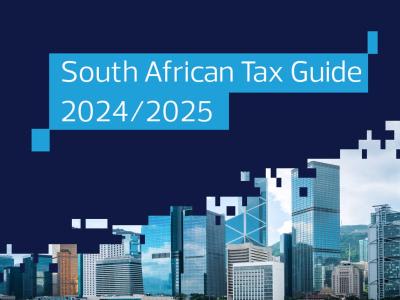Tax highlights from the 2024 Budget Speech
The 2024 Budget Speech was presented by Finance Minster Enoch Godongwana on 21 February 2024. As the speech was presented in an election year, as well as in trying economic times, there was a general expectation that no new drastic tax measures would be tabled. The budget lived up to this expectation, with no new significant changes being proposed.
A concerning point from government’s perspective was the reduction in tax revenue collection to the tune of R56.1 billion in comparison to the estimated 2023 budget values. This shortfall was ascribed to the decline in corporate profits and revenue from taxes on mining. The proposed budget tax measures are intended to generate R15 billion to alleviate the immediate fiscal pressure. That revenue will be raised primarily through personal income tax by not adjusting the tax brackets, rebates and medical tax credit for inflation.
Tax proposals
The following is a summary of selected tax proposals included in the 2024 budget:
Two-pot retirement reforms (policy update)
From 1 September 2024, contributions to retirement funds will be split, with one third allocated to a savings component and two thirds allocated to a retirement component. There are no changes to the tax deductions applicable to contributions to retirement funds.
Members will be entitled to access a portion of their retirement assets by means of a withdrawal from the savings component. This can assist members in times of need while encouraging higher savings rates and ensuring preservation of the remainder of savings to retirement.
Pre-retirement withdrawals from the savings component will be taxed at marginal income tax rates. Only one withdrawal may be made per tax year, and the minimum withdrawal amount is R2 000.
Incentivising local electric vehicle production
Producers will be able to claim 150% of qualifying investment spending on production capacity for electric and hydrogen powered vehicles in the first year of investment.
Learnership tax incentive
The section 12H learnership incentive is geared to support workplace education, skills development and employment. The sunset date for the deduction will be extended by 3 years to 31 March 2027. Over that time the incentive will be evaluated for a decision regarding its future.
Implementing the global minimum corporate tax
In terms of the OECD/G20 Inclusive Framework on Base Erosion and Profit Shifting, a global minimum tax rate is introduced. Any multinational with revenue exceeding €750 million will be subject to an effective tax rate of at least 15%, irrespective of where the profits are located. Government proposes two measures to give effect to this change, with effect from 1 January 2024.
The income inclusion rule, will enable South Africa to apply a top-up tax on profits reported by qualifying South African multinationals which are operating in other countries that have an effective tax rate below 15%.
The domestic minimum top-up tax will enable SARS to collect a top-up tax for qualifying multinationals paying an effective tax rate less than 15% in South Africa.
Excise duties on alcoholic beverages and tobacco related products
The “sin taxes” will be increased at rates exceeding the inflation levels. The increases will also extend to nicotine and non-nicotine vaping systems which were introduced from 1 June 2023.
Fuel taxes and levies
No increases in the general fuel levy have been proposed, and the Road Accident Fund levy will also remain unchanged.
Carbon tax
The carbon tax increased from R159 to R190 per tonne of CO² equivalent from 1 January 2024. Effective from 3 April 2024, the carbon fuel levy will increase to 11c/litre for petrol and 14c/litre for diesel. From 1 January 2024 the carbon tax cost recovery quantum for the liquid fuels sector increased from 0.66c/litre to 0.69c/litre.
A discussion paper will be released for comment, outlining proposals for the second phase of the carbon tax.
Embedded generation initiatives
It is proposed to increase the threshold for eligible renewable energy projects from 15 megawatts to 30 megawatts installed capacity for purposes of the carbon offset allowance, effective from 1 January 2024.
Tax treatment of certain infrastructure projects
Government will investigate the feasibility of a flow through tax treatment for certain clearly defined infrastructure projects under specified circumstances.
Interest limitation rules
Current legislation limits interest deductions when there is a relationship between a debtor and a creditor, and the corresponding interest income is not fully taxed. This may unfairly prejudice tax-exempt investors such as pension funds. This is being considered further by government for possible amendment in the 2024 Tax Laws Amendment Bill.
Curbing abuse of the employment tax incentive (ETI) scheme
Changes were already made in 2021 and 2023 to curb abuse of the ETI from aggressive tax schemes that used institutions to claim the incentive for students. Government proposes that punitive measures to support these amendments be refined to address abusive behaviour.
Payroll amendments and refunds made in the current year
In line with the move by SARS for payroll administrators to report payroll monthly, it is proposed that section 11(nA) of the Income Tax Act be amended to cater for taxpayers seeking to make refunds of amounts received or accrued during the same year of assessment.
Clarifying anti-avoidance rules for low or interest free loans to trusts
There are already anti-avoidance provisions in place aimed at curbing the tax-free transfer of wealth to trusts using low or interest free loans, advances or credit arrangements, including cross-border loan arrangements. Transfer pricing rules in the Income Tax Act also apply to counter the mispricing of cross-border loans. To avoid the possibility of overlap or double taxation, the trust anti-avoidance measures exclude low or interest free loans that are subject to the transfer pricing rules. Government has learned that the exclusion does not effectively address the interaction between the trust anti-avoidance measures and the transfer pricing rules where arm’s length interest rate is less than the official rate on these cross-border loan arrangements. It is proposed that amendments be made to the legislation to provide clarity on this topic.
Reviewing the connected person definition in relation to partnerships
The definition of a connected person in the context of a partnership or foreign partnership is wide. It has come to government’s attention that limited partners in an en commandite partnership are affected by the wide ambit of the definition. It is proposed that the status of connected persons in relation to a qualifying investor be reviewed
Limiting interest deductions in respect of reorganisation and acquisition transactions
It is proposed that the definition of “adjusted taxable income” and the formula applied to limit an interest deduction in section 23N of the Income Tax Act be reviewed for closer alignment with the changes made to the definition of the adjusted taxable income and the formula applied for the interest limitation rules for debts owed to persons not subject to tax in section 23M.
Relaxing the limitation of assessed loss rules under certain circumstances
In the context of a company that is in the process of liquidation, deregistration or being wound up, it cannot make use of the full assessed loss. It is proposed that the legislation be amended to exempt companies from applying the assessed loss restriction rule while in the process of liquidation, deregistration or winding up.
Clarifying the interaction of the value shifting provisions and the definition of “value shifting arrangement” in paragraph 1 of the Eighth Schedule
Disposals between group companies falling within the ambit of the corporate rollover relief provisions should be tax neutral. In essence, rationalising a group of companies can result in the market value of an existing shareholding of one group entity decreasing and another group entity’s newly acquired shareholding increasing, triggering the application of the value shifting rules. Commercially, the market value of the ultimate holding company’s combined direct and indirect interests in all the subsidiary companies remains unchanged. It is proposed that the definition of “value shifting arrangement” be amended to exclude certain corporate rollover transactions between groups of companies or where the value of the effective interest of the connected person remains unchanged.
Reviewing the prohibition against transfers of assets to non‐taxable transferees in terms of an “amalgamation transaction”
In general, “amalgamation transaction” rules do not apply if assets are transferred to companies that are wholly or partially exempt or fall outside the South African tax base because they are not fully taxable, in order to ensure that rollover relief is not used to obtain a permanent exemption. It has come to government’s attention that the interaction between the definition of “amalgamation transaction” and the aforementioned rule, its reference to an “amalgamated company” and cross references to a resultant company that is a foreign company that does not have a place of effective management in South Africa seem to be misaligned and unclear. It is proposed that this interaction be reviewed and clarified.
Reviewing the ambit of the de‐grouping charge in intra‐group transactions
The anti‐avoidance measures of the intra‐group corporate reorganisation rules set out the tax consequences for capital assets, allowance assets and trading stock in the event of de‐grouping subsequent to an intra‐group transaction. This is commonly referred to as a de‐grouping charge and is applied when the transferee company and a transferor company cease to form part of the same group of companies or when the transferee company ceases to form part of the same group as any controlling group company in relation to the transferor company. For the de‐grouping charge to be triggered, the de‐grouping must take place within six years of the transfer of the assets if the assets were transferred between group companies as envisaged in paragraph (a) of the definition of “intragroup transaction”. It is proposed that the scope of the de‐grouping charge be narrowed to avoid the de‐grouping charge being triggered when there is a change in shareholding affecting a group of companies, while the companies involved in the original intra‐group transactions are still part of another group of companies.
Refining “contributed tax capital” provisions
It has come to government’s attention that the following amendments are needed to further refine the contributed tax capital provisions:
Effect on legitimate transactions due to “contributed tax capital” anti‐avoidance measures - Section 8G of the Income Tax Act is an anti‐avoidance measure that limits the “contributed tax capital” of a resident company in a share‐for‐share transaction with a non‐resident group company. The taxation consequences of this anti‐avoidance measure may affect legitimate corporate finance practices and limit South Africa’s attractiveness as an investment destination. Government proposes that further refinements be considered to minimise any inadvertent tax consequences.
Translating “contributed tax capital” from foreign currency to rands - In 2023, amendments were proposed in the draft Taxation Laws Amendment Bill to clarify the translation of “contributed tax capital”, denominated in a foreign currency, to rands. The initial effective date for these proposed amendments was 1 January 2024. After reviewing stakeholder comments on the draft bill, government decided to postpone the effective date for these amendments to 1 January 2025 to give both the National Treasury and affected stakeholders more time to consider the impact of the proposed amendments. Government proposes reviewing the impact of the 2023 amendments during the 2024 legislative cycle.
Clarifying the rebate for foreign taxes on income in respect of capital gains
South African tax residents are subject to income tax on their worldwide income. The Income Tax Act provides relief to them from double taxation where the same amount is taxed by more than one tax jurisdiction. Section 6quat of the Income Tax Act provides that a taxpayer should get credit for the taxes paid in the relevant foreign jurisdiction but limits this to the South African tax on the amount taxed in South Africa. According to the foreign tax credit rules dealing with foreign dividends, the tax‐exempt portion must not be taken into account when determining the allowable foreign tax credit. However, the rules dealing with capital gains have no corresponding provision for the non‐taxable portion of the capital gain. It is proposed that section 6quat be amended to explicitly allow for a full foreign tax credit against tax payable in South Africa on a capital gain for taxes payable in the relevant foreign jurisdiction on the disposal of an asset. This will ensure a similar treatment as for foreign tax credits for taxable foreign dividends.
Updating the VAT Electronic Services Regulations
Government proposes to revise and update the Electronic Services Regulations (and relevant sections of the VAT Act) to keep up with changes in the digital economy and ease the administrative burden. The scope of the regulations should be limited to only non‐resident vendors supplying electronic services to non‐vendors or end consumers.
Prescription period for input tax claims
To ease the administrative burden on both taxpayers and SARS, it is proposed that the VAT Act be amended in relation to the tax period in which past unclaimed input tax credits may be claimed. To ensure ease of audit functions and clarity of returns in this regard, it is also proposed that the VAT Act be amended to clarify that such deductions be made in the original period in which the entitlement to that deduction arose.
Non‐resident vendors with no or a limited physical presence in South Africa
Due to the wide definition of “enterprise”, non‐resident vendors may be required to register as vendors, despite not having any physical presence in South Africa or having a very limited presence for a short period of time. These non‐residents have difficulties in appointing a representative vendor who resides in South Africa and in opening a South African bank account, as is required to register as a vendor. As a result, non‐resident suppliers of electronic services were exempted from these requirements.
To facilitate engagement and compliance, it is proposed that electronic services suppliers be required to appoint a representative vendor, but that the requirement that such person must reside in South Africa be waived while maintaining the exemption from opening a South African bank account. Furthermore, it is recommended that the aforementioned dispensation be afforded to non‐resident vendors with no, or a limited, presence in South Africa in specified circumstances.





